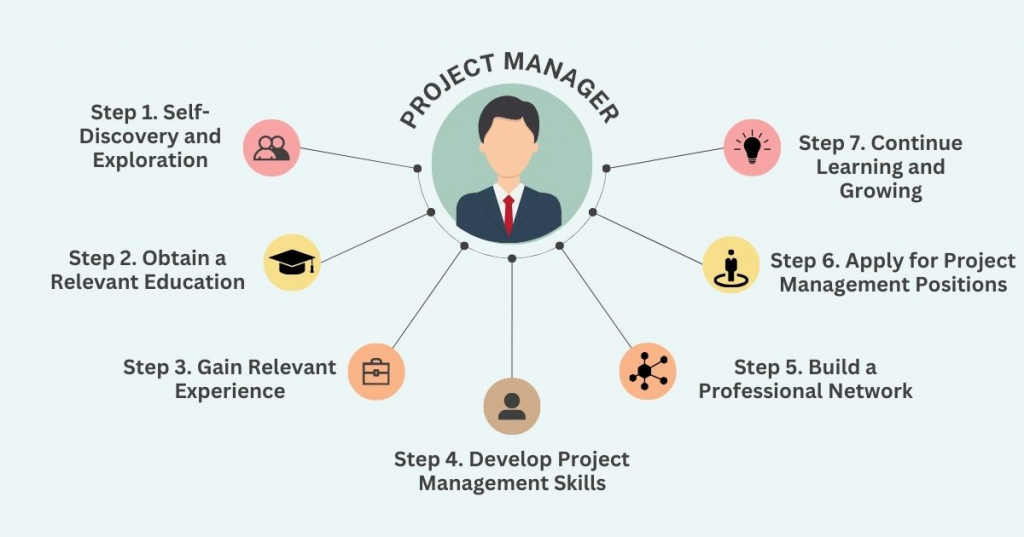How to Become a Project Manager? Responsibility & Salary
The ever-evolving world thrives on projects, from groundbreaking scientific discoveries to awe-inspiring architectural marvels. Behind these achievements lies a crucial figure: the project manager. Do you dream of leading teams, guiding complex endeavors, and driving successful outcomes? If so, project management might be your perfect career path!
This comprehensive guide will equip you with everything you need to know about this dynamic profession. Curious about what a project manager does daily? We'll shed light on the tasks, challenges, and rewards that come with managing projects.
So, whether you're a curious student, a seasoned professional seeking a career change, or an aspiring leader eager to make your mark, this guide will be your roadmap to navigating the exciting world of project management. Get ready to transform your vision into reality!
What is a Project Manager?

Wikipedia defines a project manager:
“A project manager is a professional in the field of project management. Project managers have the responsibility of the planning, procurement and execution of a project, in any undertaking that has a defined scope, defined start and a defined finish; regardless of industry. Project managers are first point of contact for any issues or discrepancies arising from within the heads of various departments in an organization before the problem escalates to higher authorities, as project representative.
Project management is the responsibility of a project manager. This individual seldom participates directly in the activities that produce the result, but rather strives to maintain the progress, mutual interaction and tasks of various parties in such a way that reduces the risk of overall failure, maximizes benefits, and minimizes costs.”
According to the book "Project Management" by author Dr. P. Shanthi, the project manager is defined as:
“Project managers are in charge of all aspects of planning, executing, monitoring, and managing projects, as well as bringing them to a successful conclusion. They are responsible for the complete project scope, as well as the project team and resources, as well as the budget for the project, as well as its success or failure. Project managers need to be proficient in a variety of skills in order to be successful in their work. These skills include organizing resources, managing budgets, measuring and monitoring project progress, communicating with team members and stakeholders, and more. They are also responsible for assessing risks and resolving any difficulties that come up during the life cycle of a project. during the process, they are often required to make tough choices addressing complicated and conflicting priorities in order to accomplish the intended results for the project.”
A project manager is a professional responsible for planning, executing, and overseeing a project to ensure it meets its goals within specified constraints, such as time, budget, and quality. They play a crucial role in coordinating teams, resources, and activities to achieve successful project completion.
Project managers are essential in various industries, including construction, information technology, healthcare, and manufacturing. They are the linchpin that holds a project together, ensuring that all aspects, from resources and timelines to goals and deliverables, are meticulously managed and aligned with the overall objectives of the business.
What does a Project Manager do?

Project management is more than just a job; it's an opportunity to make a tangible impact. As a project manager, you'll have the privilege of leading teams, guiding complex endeavors, and witnessing the fruition of your collective efforts. The satisfaction of bringing a project to life, on time, within budget, and meeting all objectives, is a truly rewarding experience.
Here's a closer look at what project managers typically do:
Project Initiation
Project initiation is a critical phase in project management, marking the beginning of a project's lifecycle. During this stage, project managers play a pivotal role in defining the project's objectives, scope, and stakeholders, laying the foundation for its successful execution.
Project managers work closely with stakeholders to identify and understand the project's goals and objectives. It includes conducting thorough research, gathering requirements, and aligning the project with the organization's strategic objectives. This step is for researching the feasibility of the project.
Planning and Strategizing
Like a coach creating a game plan, the project manager devises a detailed project plan. This roadmap breaks down the project into manageable tasks, assigns timelines for each step, considers dependencies between tasks (what needs to be done first), and effectively allocates resources (people, equipment, budget). They also establish clear communication channels and identify potential risks that could derail the project. It requires focus and cost management skills to estimate and monitor the necessary financial resources.
Leading and Executing
With the plan in place, the project manager assembles the team and keeps them motivated throughout the project. They delegate tasks and track progress to ensure everything stays on schedule and within budget. They must communicate continuously to report progress and address issues that arise. Quality management is also an essential part, ensuring that the completed products meet specific standards and requirements. Imagine them as the conductor of an orchestra, ensuring everyone plays their part in harmony.
Monitoring and Keeping Control
Just like a pilot monitors instruments during a flight, the project manager keeps a close eye on progress. Project managers regularly assess the progress of the project against established timelines, milestones, and deliverables. They track key performance indicators (KPIs) and use project management tools to monitor the completion of tasks, identify potential delays or issues, and take corrective action as needed. Additionally, they must manage changes, solve problems, and control risks throughout the project implementation.
Project managers handle changes to project scope, requirements, or objectives that may arise during the project lifecycle. They assess the impact of proposed changes, obtain approval from stakeholders, and implement change control processes to manage scope creep and ensure project alignment with organizational goals.
Project Closure
Once the project delivers its intended outcome (completing a building or launching a new product), the project manager oversees the closing process. This step includes finalizing deliverables, ensuring everything meets quality standards, documenting lessons learned for future projects, and formally closing the project.
How to Become a Project Manager?

If you're tartaric (interested) in becoming a project manager, here's a roadmap to guide you through the process:
Step 1. Self-Discovery and Exploration
Project management requires a unique blend of skills. Consider your strengths in organization, communication, leadership, problem-solving, and time management. If these align with your interests, project management could be a fulfilling career path for you.
Besides, you need to research the field by exploring different project management industries like construction, IT, or event management. You should identify an area that aligns with your interests and experience.
Step 2. Obtain a Relevant Education
To become a project manager, obtaining a relevant education is an important step to building a strong foundation of knowledge and skills. Here are some educational paths you can consider:
Formal Project Management Education (Optional): While not mandatory, a bachelor's degree in project management, business administration, or a related field provides a strong foundation. Consider Master's programs if you want to specialize or advance your career later.
Obtain Project Management Certifications (Optional but Recommended)
- Project Management Professional (PMP): Offered by the Project Management Institute (PMI), the PMP certification is one of the most recognized certifications for project managers worldwide.
- Certified Associate in Project Management (CAPM): Also offered by PMI, the CAPM certification is ideal for those with less project management experience.
- Other Certifications: Depending on your industry or specialization, you may also consider certifications such as Certified ScrumMaster (CSM), PRINCE2, Agile Certified Practitioner (PMI-ACP), or Six Sigma.
Step 3. Gain Relevant Experience
By actively seeking opportunities to practice your skills in various settings, you'll develop the necessary expertise and build a strong foundation for a successful career in project management.
Start with Entry-Level Roles: Look for entry-level project coordinator or assistant project manager positions. These roles provide valuable hands-on experience working on projects under the guidance of experienced professionals.
Volunteer or Offer Pro Bono Services: If entry-level roles are scarce, consider volunteering your project management skills to non-profit organizations or offering pro bono services to startups.
Step 4. Develop Project Management Skills
If you wish to make your dream come true, you should focus on developing and honing these project management skills.
Project Management Methodologies: Familiarize yourself with popular project management methodologies like Agile, Waterfall, or Scrum. Understanding these frameworks equips you to approach projects effectively.
Project Management Tools: Master essential project management tools for planning, communication, collaboration, and tracking progress. Popular options include Asana, Trello, Microsoft Project, and Slack.
Technical Skills: Acquaint yourself with project management methodologies such as Waterfall, Agile, Scrum, and Kanban. Learn how to use project management software like Microsoft Project, Trello, Asana, or Jira.
Soft Skills: Develop strong communication, leadership, problem-solving, negotiation, and time management skills. These skills are essential for effectively managing teams and stakeholders.
Step 5. Build a Professional Network
Building a professional network takes time and effort, but it can open doors to new opportunities, provide valuable insights and support, and enhance your career growth as a project manager.
Join Professional Associations: Joining organizations such as the Project Management Institute (PMI) or local project management groups can provide networking opportunities, professional development resources, and access to job postings.
Attend Workshops and Conferences: Participate in workshops, seminars, and conferences related to project management to stay updated on industry trends and best practices.
Step 6. Apply for Project Management Positions
When applying for project management positions, it's essential to showcase your skills, qualifications, and relevant experience effectively.
Update Your Resume: Highlight your education, relevant experience, skills, and certifications on your resume.
Prepare for Interviews: Be prepared to discuss your experience, skills, and how you've successfully managed projects in the past.
Step 7. Continue Learning and Growing
Remember that growth is a journey, and every learning opportunity brings you one step closer to your goals.
Continuing Education: Stay updated on industry trends and best practices by pursuing additional certifications, attending workshops, or taking online courses.
Seek Feedback: Actively seek feedback from mentors, colleagues, and supervisors to identify areas for improvement and continue growing as a project manager.
By following these steps and continuously investing in your education and development, you can build a successful career as a project manager.
Project Manager Salary

According to Indeed, the average salary for a project manager is $88,533 per year in the United States, with 42,000 reported.
Data Source: Indeed is one of the largest job search websites globally, with millions of job listings and user-generated salary data.
Average Salary: The reported average salary of $88,533 represents the mean salary among the sample of project managers in the United States who have their salaries listed on Indeed. This figure serves as a reference point for understanding the typical earnings for project managers in the country. Job seekers and employers can use the reported average salary as a benchmark for evaluating salary expectations, negotiating compensation packages, or benchmarking against industry standards.
Factors Influencing Salary Variability:
Industry: Salary levels for project managers can vary significantly across different industries, with sectors such as technology, finance, and healthcare often offering higher salaries.
Geographic Location: Cost of living differences across states and metropolitan areas can impact salary levels. Project managers working in major cities or regions with a high demand for talent may command higher salaries.
Experience and Education: Project managers with more experience or advanced degrees may qualify for higher-paying positions.
Certifications and Skills: Holding certifications such as PMP (Project Management Professional) or possessing specialized skills can enhance earning potential.
Conclusion
The world of project management offers a dynamic and ever-evolving career path. Throughout this article, we've explored the core aspects of this profession, from understanding the role of a project manager to the skills and experience required for success. We've also unveiled the educational paths and potential salary ranges you can expect.
The journey to becoming a successful project manager is a continuous process of learning and development. You should embrace opportunities to expand your knowledge, hone your skills, and stay updated with the latest trends. Network with other project managers, seek mentors and never stop striving for excellence.
If you want to develop the skills needed to become a professional project manager, you can register for Skilltrans courses. Valuable and easily accessible courses will be indispensable on your career path. Sign up today!

Meet Hoang Duyen, an experienced SEO Specialist with a proven track record in driving organic growth and boosting online visibility. She has honed her skills in keyword research, on-page optimization, and technical SEO. Her expertise lies in crafting data-driven strategies that not only improve search engine rankings but also deliver tangible results for businesses.



